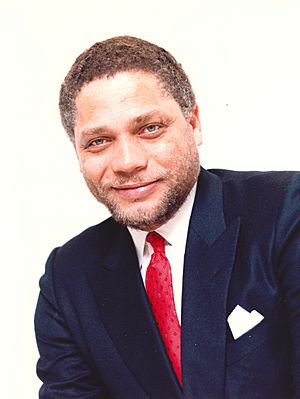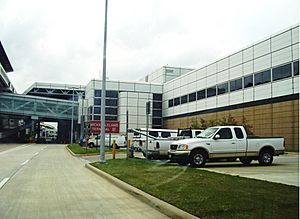Mickey Leland facts for kids
Quick facts for kids
Mickey Leland
|
|
|---|---|
 |
|
| Member of the U.S. House of Representatives from Texas's 18th district |
|
| In office January 3, 1979 – August 7, 1989 |
|
| Preceded by | Barbara Jordan |
| Succeeded by | Craig Washington |
| Member of the Texas House of Representatives from the 88th district |
|
| In office January 9, 1973 – January 3, 1979 |
|
| Preceded by | Unknown |
| Succeeded by | El Franco Lee |
| Personal details | |
| Born |
George Thomas Leland
November 27, 1944 Lubbock, Texas, U.S. |
| Died | August 7, 1989 (aged 44) Gambela, Ethiopia |
| Political party | Democratic |
| Spouse |
Alison Clark Walton
(m. 1983) |
| Children | 3 |
| Education | Texas Southern University (BS) |
George Thomas "Mickey" Leland III (November 27, 1944 – August 7, 1989) was an important activist who fought against poverty. He later became a congressman for Texas and led the Congressional Black Caucus. He was a member of the Democratic Party.
Contents
Early Life and Education
Mickey Leland was born in Lubbock, Texas. When he was very young, his family moved to the Fifth Ward neighborhood in Houston.
He grew up in a neighborhood with many African American and Hispanic families. Leland went to Wheatley High School in Houston, where he was one of the top students. He graduated in 1964.
While studying at Texas Southern University in the late 1960s, he became a strong leader in the civil rights movement in Houston. He even brought national civil rights leaders to the city.
Leland earned a bachelor's degree in Pharmacy from Texas Southern in 1970. After graduating, he taught pharmacy at his university for a year. He also started programs to visit low-income neighborhoods, telling people about their healthcare options and offering basic health checks.
Later, Texas Southern University gave him an honorary doctorate degree. This was a special award to recognize his achievements.
Serving in Texas
In 1972, Texas changed how it elected its state representatives. For the first time, people voted for representatives in smaller, single-member districts. Soon after this change, five minority candidates, including Mickey Leland, ran for seats in the Texas House of Representatives.
This was a big moment because there hadn't been any African-American state representatives in Texas since the Reconstruction era.
Leland was re-elected in 1974 and 1976. He served three two-year terms in the Texas House of Representatives, representing the 88th District. While working in the state capital, Austin, he became well-known for defending the healthcare rights of poor Texans.
He helped pass laws that made affordable generic medicines available to people with low incomes. He also supported creating Health Maintenance Organizations (HMOs) to give more people access to healthcare. To achieve his goals, Leland served on several important committees in the Texas House. He was also the first African-American to serve on a special committee that worked with both the House and Senate on budget issues.
Working in the U.S. Congress
After six years in the Texas State Legislature, Leland was elected to the United States House of Representatives in November 1978. He represented Texas's 18th District. He was easily re-elected five more times, serving until his death in 1989.
His congressional district included the neighborhood where he grew up. People saw him as a knowledgeable champion for health, children, and the elderly. His leadership skills were quickly noticed in Washington, D.C. He was chosen to be a "Freshman Majority Whip" in his first term, which means he helped gather support for his party's plans.

Leland was a strong supporter of issues related to hunger and public health. In 1984, he helped create the congressional Select Committee on Hunger. He also started many programs to help with the severe hunger crises in Ethiopia and Sudan during the 1980s. Leland was also known for wearing African-style clothing like a dashiki and hats in Washington.
As he visited places like soup kitchens and shelters, he became very concerned about people who were hungry and homeless. His most remembered work began when he helped create the House Select Committee on Hunger. U.S. Speaker of the House Tip O'Neill chose Leland to be its chairman in 1984. The committee's job was to "study and review the problems of hunger and malnutrition."
Even though the committee couldn't pass laws directly, it became the main place to focus on hunger issues. Leland's ability to raise awareness and his strong moral leadership made the committee very impactful. Besides focusing on hunger, his ideas led to the creation of the National Commission on Infant Mortality. He also helped create better access to fresh food for women, children, and babies who were at risk. He also helped establish the first complete services for homeless people.
Leland's care for the immediate needs of poor and hungry people soon made him a spokesperson for hungry people around the world. When reports of severe hunger in Africa came out, Speaker O'Neill asked Leland to lead a group from Congress to see the situation and figure out what help was needed.
When Leland returned, he brought together famous entertainers, religious leaders, and private groups. Together, they created public support for the Africa Famine Relief and Recovery Act of 1985. This law provided $800 million in food and humanitarian aid. The international attention Leland brought to the famine also led to more support from non-government groups, saving thousands of lives.
His ability to connect with others and get support from unexpected places was key to his success. He met with Pope John Paul II to talk about food aid for Africa. He also met with Cuban President Fidel Castro to discuss reuniting Cuban families. In Moscow, he suggested a joint U.S.-Soviet food effort for Mozambique.
As the leader of the Congressional Black Caucus, Leland proudly gave awards to non-black people for the first time. These were rock musician Bob Geldof and news anchor Ted Koppel. Geldof was honored for his Band Aid concert and fundraising for African famine victims. Koppel was honored for his news stories about the African famine.
Leland was also a powerful voice on other important issues. While leading the House Select Committee on Hunger, he was also a member of the Committee on Energy and Commerce. He served on subcommittees dealing with telecommunications, finance, health, environment, energy, and power. He also led the Subcommittee on Postal Operations and Services.
Death
On August 7, 1989, Mickey Leland died in a plane crash in Gambela, Ethiopia. He was on a mission to Fugnido, Ethiopia, to help people. A total of 15 people died in the crash. Leland's friend and former Texas legislator, Craig Washington, was elected to take his place in Congress in December 1989.
Personal Life
Mickey Leland was Catholic.
Legacy
Since Mickey Leland's death, many places and programs have been named in his honor:
- A federal building in Downtown Houston (which is now the office for Congresswoman Sheila Jackson Lee)
- The International Terminal (Terminal D) at George Bush Intercontinental Airport in Houston
- A street and a condominium village in Addis Ababa, Ethiopia
- The USAID Leland Initiative, which helped improve internet connectivity in Africa
- The Texas Commission on Environmental Quality’s Mickey Leland Environmental Internship Program
- The Department of Energy's Minority Education Initiative, renamed the Mickey Leland Energy Fellowship
- Many other government programs, fellowships, and school organizations
- Singer-songwriter Pierce Pettis included a song about Leland on his 1991 album Tinseltown.
- The Mickey Leland College Preparatory Academy for Young Men in Houston
- The Barbara Jordan-Mickey Leland School of Public Affairs at Texas Southern University.
- So Others Might Eat's Leland Place, a housing program for homeless men in Washington, D.C.
There is also a statue of Leland in Hermann Park, Houston, near the Miller Outdoor Theatre.
See Also
- History of African Americans in Houston
- List of United States Congress members who died in office (1950–1999)
- List of African-American United States representatives
Images for kids
 | Delilah Pierce |
 | Gordon Parks |
 | Augusta Savage |
 | Charles Ethan Porter |


